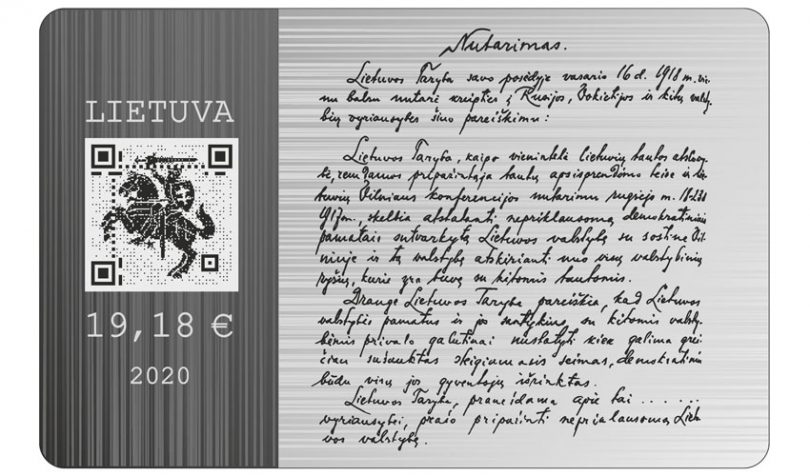The Bank of Lithuania plans to issue a blockchain-based digital collectible coin, the LBCoin. In celebration of the anniversary of Lithuania’s independence on 16 February 1918, the coin’s face value will be € 19.18.
“This innovative coin will feature the signatories due to their significant role in the country’s history and contribution to the restoration of our independence. Quite a few of them could be called innovators of their time, as they created and brought progress to Lithuania,” said Marius Jurgilas, Member of the Board of the Bank of Lithuania. Additionally, the bank has published a global review of Central Bank Digital Currencies (CBDC).
The project is part of the ongoing development of blockchain skills within the Bank, including exploring virtual currencies. “It is especially relevant now since central banks tend to discuss these topics more openly and an outline of such currencies is slowly starting to emerge,” said Mr Jurgilas.
The digital coin which will be available to buy from the Bank’s e-shop next year, can be used to redeem a real silver coin. However, it’s not a straight forward swap. There were twenty signatories in Lithuania’s declaration of independence, and there will be a token representing each of them which can be collected.
However, each coin will provide six tokens, and the 24,000 tokens will be divided into six categories based on the signatories’ activities. But buying a coin will provide randomly selected tokens so it won’t necessarily give one signatory from each category, which is what is needed to redeem a coin. Presumably, the idea is that people swap tokens or buy additional ones to get a set of six.
A spokesperson for the Bank told Ledger Insights that the project uses NEM blockchain technology and digital tokens will be stored on a private wallet provided by the Bank of Lithuania. However, there will be the possibility to move the tokens to a public NEM blockchain wallet.
The Baltic nation has been a strong proponent of cryptocurrencies and has made regulatory provisions to accommodate ICOs. In 2018, Lithuania set-up the Blockchain Centre Vilnius along with some big names such as Price Waterhouse Coopers, the Israeli Blockchain Association, Lithuanian Marketing Association and many others.
Meanwhile, the central bank is also working with IBM Poland and Tieto Lithuania to create its blockchain platform LBChain. The solution is primarily a regulatory sandbox to enable blockchain startups to develop an application from the ground up.
The use of blockchain for collectibles has been reserved mainly for games and sports until now, so numismatics is a new genre. UK-based Fantastec has a blockchain game SWAP for football collectibles which has signed Real Madrid, Borussia Dortmund and Arsenal. Paris-based Sorare has licensing deals with Atletico Madrid, Valencia CF and West Ham United, among many others, for blockchain collectibles as part of its fantasy football game.
A few weeks ago, Formula 1’s blockchain game F1 Delta Time held auctions for tokens of 10 official team cars. Hong Kong-based Animoca Brands developed the game.






